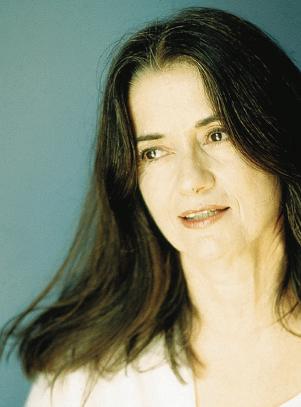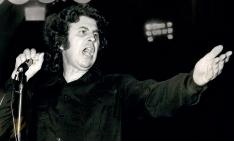
7 minute read
Greece is the word
SPOTLIGHT ELENI KARAINDROU
Prolific Greek composer and WSA lifetime achievement award recipient Eleni Karaindrou tells Wendy Mitchell why she loves putting her own spin on traditional music
Advertisement
reek composer Eleni G Karaindrou fell in love with music and movies at a young age. She grew up in the mountain village of Teichio, where she listened to old ladies singing folk songs, or Byzantine hymns at church. When she was seven, her family moved to Athens, which proved to be just as stimulating. “There was an open cinema next to our house, and from our windows I was watching every night,” Karaindrou, now aged 79, recalls. “I saw Anna Karenina so many times! The music touched me. After they showed the film, I would go to my school’s piano and improvise, to try to find the feelings I had from the cinema.”
It was many years later when she made it her profession to compose for the cinema and theatre. Karaindrou — who will receive the WSA lifetime achievement award and have her work celebrated, along with other Greek composers, in a special concert — had studied in Athens (attending the conservatory of music aged just 10) and Paris (where she moved for seven years during Greece’s military junta that started in 1967). She originally thought she would become a classical pianist, but that love for the movies drew her back in. “Things happen because they have to happen,” she says.
While also studying archaeology and history, she was drawn into ethnomusicology — the study of music in its cultural and social contexts — which was “a new science then. I discovered many new worlds of music, from all around the world. I think ethnomusicology opened a new horizon for me.”
When she returned to Greece after the dictatorship ended in 1974, she created the laboratory for traditional instruments at the Ora Cultural Centre in Athens, as well as working on ethnomusicology projects at Hellenic Radio. At the same time, she was being asked by friends including Hristoforos Hristofis to help them compose for films. “I am an autodidact as a composer. I am a pianist; I know orchestration and how to direct an orchestra. But nobody taught me how to compose for film or for the theatre. But I found a way.”
Eleni Karaindrou, composer
Creative trailblazer
That is particularly impressive as Karaindrou — who has been called “Greece’s most eloquent living composer” by Time magazine — was one of very few women working in the field during the 1970s and ’80s. “When I was first in a studio with an orchestra, I discovered that I needed to be well-prepared and disciplined,” she recalls. “And then I would be respected. I didn’t really have difficulties, but I do think I made more effort to be prepared than if I were a man.”
Karaindrou has worked with great directors over the course of her career, across both cinema and theatre, and says it is always “very important to me to be sure I’m speaking the same language with the person, to have the same affinity intellectually. I was never a person who has done music for cinema just to get money, never!
“The way to work is to know the person well,” she continues, “to discuss with him or her, to try to understand the inner feelings and the inner position and the central idea. Why does he or she want to do this film?”
Karaindrou had a particularly special working relationship with Theo Angelopoulos, who is the subject of a full retrospective at this year’s Film Fest Ghent. The pair collaborated on eight films including 1995 Cannes grand jury prize winner Ulysses’ Gaze; 1998 Palme d’Or winner Eternity And A Day; and The Beekeeper (1986) starring Marcello Mastroianni.
They had a way of working that would surprise most composers. First they would speak for many hours, then she would compose her music before the film started shooting. She would give this music to Angelopoulos and he could be inspired by her work while shooting and editing. Of course, sometimes a few tweaks had to come in post. “It was a fantastic way to work,
Eleni Karaindrou, a star since the 1970s, is the recipient of the WSA lifetime achievement award
Katerina Marianou
perhaps it was not orthodox,” she notes. “It was a way of two creators.”
She has worked in a more typical fashion of composing in the edit with other directors, such as Margarethe von Trotta, Jules Dassin and Chris Marker. Currently she is collaborating with US director Terrence Malick on his Biblical story Th e Way Of Th e Wind. She will not say too much about the project, out of respect for the famously secretive Malick, but she says she met him in Turkey before he started the shoot, and that he is close to fi nishing the fi lm. “I think he is happy with me and I am very happy with the collaboration,” she adds.
Malick, in fact, was already a fan of her work, taking songs from her solo releases on ECM Records to use in fi lms such as his Imax project Voyage Of Time: Life’s Journey. In a diff erent beast of fi lm, George Miller also used several of her pieces in Mad Max: Fury Road (2015).
Given the nature of her career, Karaindrou says her WSA lifetime achievement award is also in recognition of her many collaborators. During the awards weekend in Ghent, a selection of her work will be performed by the Brussels Philharmonic and conducted by Dirk Brossé, with Karaindrou herself accompanying on piano (October 22, see boxout).
“I accept this honour with gratitude and big pleasure, and I would love to share this honour with my directors, especially Th eo Angelopoulos, and Manfred Eicher [founder of her longtime label ECM],” she says. “We’ve had a fantastic journey together for more than 30 years.” SPOTLIGHT GREEK COMPOSERS

Brussels Philharmonic will play work by Greek composers including the late Mikis Theodorakis
National celebration
Film Fest Ghent, in collaboration with the WSA, will host a concert featuring the work of Eleni Karaindrou and other Greek composers
Inspiring work
Despite her long career and unique sound, Karaindrou still takes inspiration from great soundtrack composers of the past and present. “I love Max Steiner because of Casablanca, I am from that generation,” she says, before also mentioning Nino Rota, Ennio Morricone, Antoine Duhamel, Georges Delerue, Bernard Herrmann and more contemporary names such as Alexandre Desplat and Rachel Portman. “I have many more that I think are great. And I am happy I see we have more women, bravo to us!”
Karaindrou loves her work and has no plans to retire, but she now takes on fewer projects. “I am doing takes on fewer projects. “I am doing only things that I admire, that make only things that I admire, that make me happy. I am not really me happy. I am not really interested in a ‘career’ interested in a ‘career’ anymore,” she says. anymore,” she says. “But I cannot live “But I cannot live without music. without music. I am very happy I am very happy that music is a that music is a real friend.” ■ s
(Right) Karaindrou with Karaindrou with fi lmmaker Theo fi lmmaker Theo Angelopoulos Angelopoulos
I
have many passions for Greek music,” says Greek composer Eleni Karaindrou, who particularly enjoys using local instruments such as the santouri and kanonaki. “This country has such a rich musical tradition that’s also varied between parts of the country. I like to blend the colours of the symphony orchestra with some colours of the traditional music, but using it in my way and style.”
Film Fest Ghent will celebrate Karaindrou’s work with a live concert (October 22) performed by the Brussels Philharmonic with Karaindrou accompanying on piano. It will also feature the work of other Greek composers including Evanthia Reboutsika (WSA discovery of the year, 2006), who has scored fi lms including Cagan Irmak’s My Father And My Son and Hasan Kirac’s Two Hearts As One. Reboutsika will be present to play violin at the concert. Alongside their works, the Brussels Philharmonic will play selected compositions from fellow countrymen Mikis Theodorakis (whose credits include Serpico and The Man With The Carnation); Nikos Kypourgos (Master Of The Shadows, Four Corners Of Suburbia); Manos Hadjidakis (who won an Oscar for his score for Jules Dassin’s Never On Sunday); and perhaps Greece’s best-known composer, Oscar winner Vangelis (Chariots Of Fire, Blade Runner, Alexander).
“
Eleni Karaindrou
to play violin at the concert. Alongside their works, the Brussels Philharmonic will play selected compositions from fellow countrymen Mikis Theodorakis (whose credits include Man With The Carnation Kypourgos ( Four Corners Of Suburbia Hadjidakis (who won an Oscar for his score for Jules Dassin’s On Sunday best-known composer, Oscar winner Vangelis ( Runner





